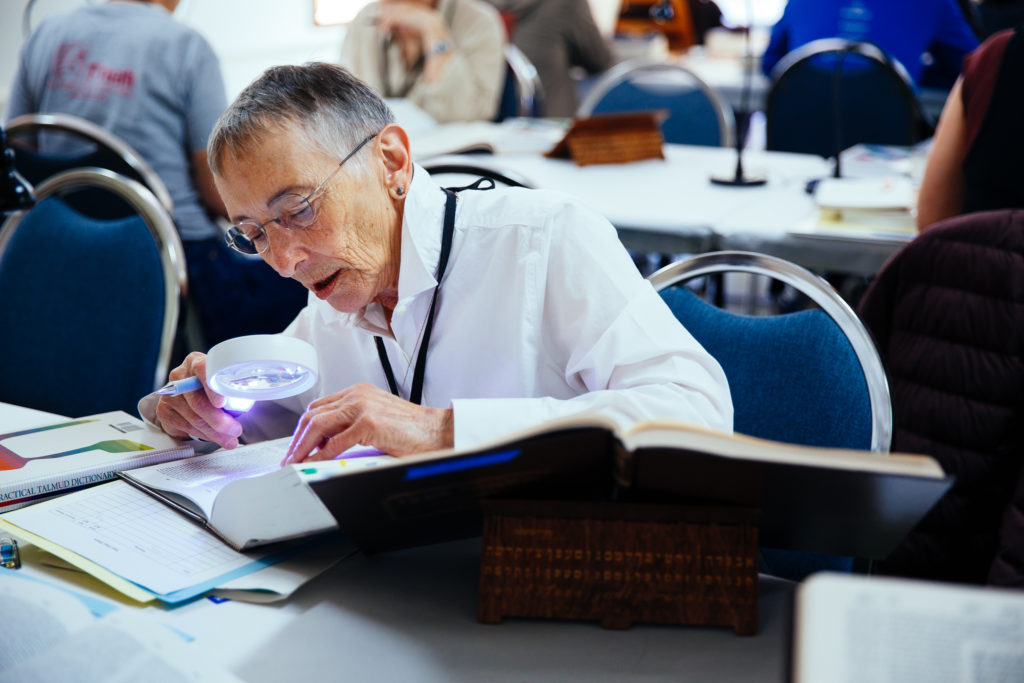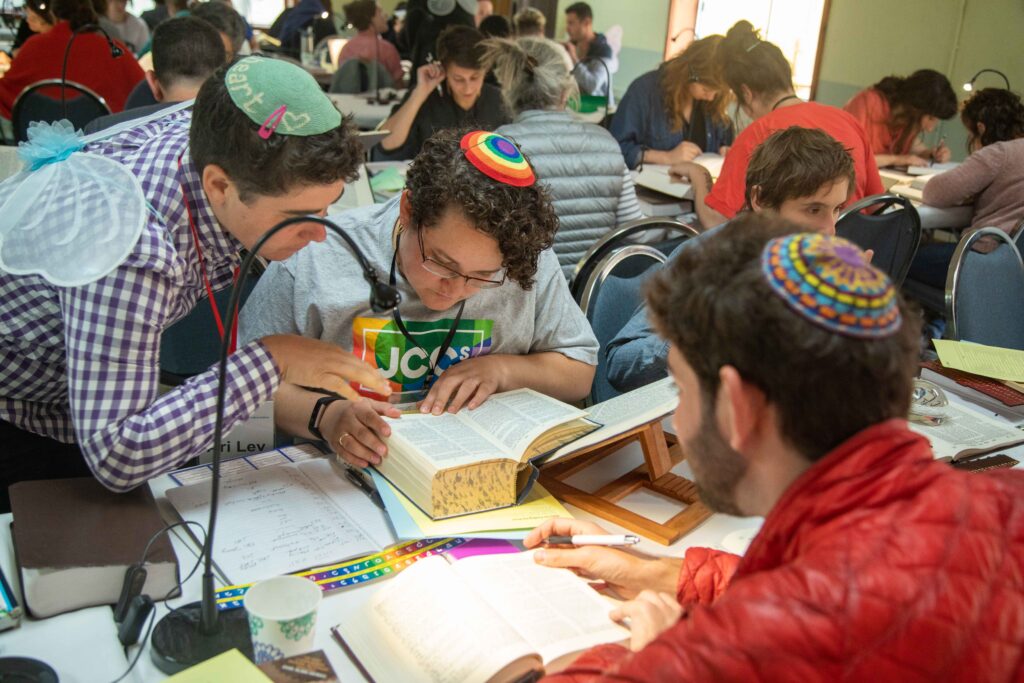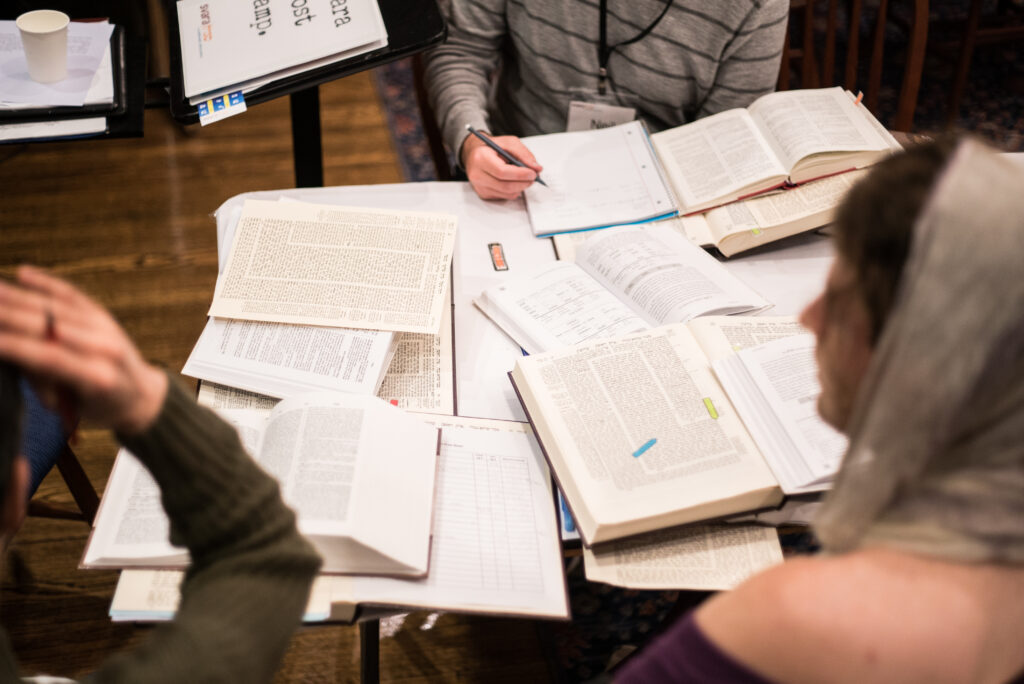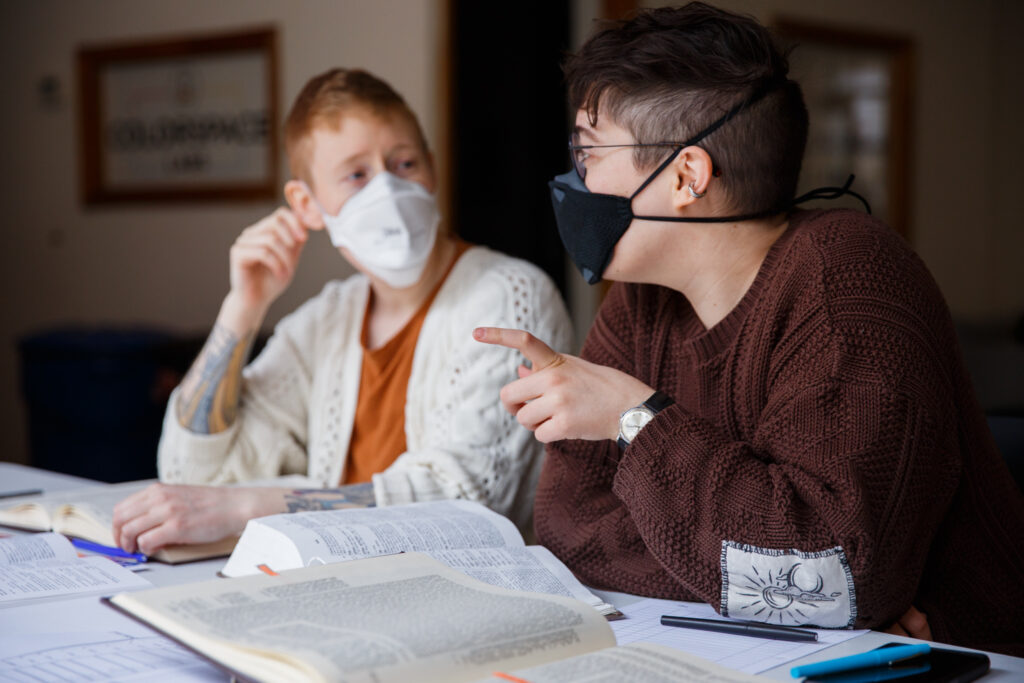One rather dark night in 2009, I sat on my bed in my college dorm room and typed out a list of “Things I want but think I will never have.” There were six entries on the list, all of them fairly large and terrifying, and among them was this line:
“A Jewish community that I actually like.”
I saved the list in a file, stuck the file in some random corner of my computer, and probably cried for a while. And then, for the next five or six years, I forgot that I had written the list.
Life went on, hard and good and rewarding and disappointing and surprising. I graduated from college, held some jobs, got some fellowships, lived in some different places, and built my adult Jewish life. At some point, around 2014 or 2015, I rediscovered the old list I’d written, and found to my astonishment that – at that moment – I did feel as though I had a Jewish community to which I felt profoundly connected. I could only process that moment as a miracle.
At the same time, nothing is simple, and what I’ve observed over the intervening years is that I’ve moved in and out of feeling connected and settled in Jewish community. I’ve sought out – and been lucky to find – revolutionary, progressive, visionary Jewish spaces. And, I’ve been in spaces that first held me, but then harmed me. I’ve been in spaces that held me while harming me at the very same time.
When I’ve suffered greatly, it’s usually been at the hands of communities that were created by others who had suffered in their previous communities, and left them to form new spaces where their humanity and Jewish practice could be more fully celebrated. That’s exactly what is so confusing and painful about the ways I’ve been marginalized in these spaces. I’ve often wondered, are all my feelings and perceptions wrong? Am I just “crazy”? How could people who have experienced marginalization, and sought freedom, turn around and perpetrate the same injustices, often (seemingly) unreflectively, and sometimes unrepentantly? Is it even reasonable for me to want – to expect – better?
I imagine that I’m far from the only person in SVARA spaces who’s had this experience of needing a community that already sees itself as “enlightened” to do better (and feeling gaslit – however unintentionally – by the supposed progressiveness of the people doing the harm). For me, as a high-risk person, the COVID pandemic has exacerbated many of these communal dynamics. At the same time, we all carry with us complex mixtures of privilege and marginalization; I imagine, therefore, that I’m also not the only person at SVARA who fears that I myself will replicate the same power dynamics from which I have suffered.
What can we do? Can we ever really feel safe, settled, at home, and aligned with our values in community?
I want to talk about being settled, and being unsettled, and the attractions and dangers of both – and I want to do it through the lens of the Jacob narrative that we are currently moving through in the yearly Torah portion cycle.
In last week’s parasha, Toldot, we read about how Jacob was forced to flee his home in Canaan to save himself from his murderous brother Esau, who was enraged by Jacob’s acquisition of the birthright. Over the coming few weeks, we will follow Jacob through many more trials: being tricked by Lavan and later forced to flee from Lavan’s house, wrestling with the angel, encountering Esau after many years, and the death of his beloved Rachel.
Finally, in a few weeks, when we reach Bereshit/Genesis chapter 37 – also known as Parashat VaYeshev – we will read:
וַיֵּ֣שֶׁב יַעֲקֹ֔ב בְּאֶ֖רֶץ מְגוּרֵ֣י אָבִ֑יו בְּאֶ֖רֶץ כְּנָֽעַן׃
Jacob settled in the land where his father had sojourned, the land of Canaan.
Vayeshev Yaakov. By the time he reaches Canaan, Jacob must desire nothing more than to finally cease his wandering, rest his weary body and soul, and raise his family.
And yet, the midrash finds Jacob’s desire to settle down ominous. In Midrash Tanchuma, as quoted by Rashi, we find that the rabbis immediately question the nature of Jacob’s settling, reminding us of the tragic drama with Joseph that is about to unsettle him and his family once again:.
כָּל מָקוֹם שֶׁהוּא אוֹמֵר וַיֵּשֶׁב, לְשׁוֹן צַעַר הוּא… וְאַף כָּאן וַיֵּשֶׁב יַעֲקֹב, וַיָּבֵא יוֹסֵף אֶת דִּבָּתָם רָעָה.
And Jacob dwelt in the land (Gen. 37:1). Whenever the Torah uses the expression “and he settled,” it connotes misfortune… In this instance “And Jacob settled” is followed by “And Joseph brought evil report of them unto his father” (Gen. 37:2).
Recognizing that its claim about the word “Vayeshev” may surprise us, the midrash brings examples of other times when “Vayeshev,” and he settled, indicates that something bad is about to happen. These examples include the moment just before Joseph’s brothers remove him from the pit and sell him to the Ishmaelites, the incident of the Golden Calf, and just before the Israelites begin to worship foreign gods at Shittim. In other words, to put a sharper point on it, most of the examples the midrash brings are instances when the Israelites settle down – Vayeshev – just before a major sin is about to occur.
This midrash spurred me to think about whether there is a deeper connection between Jacob’s settling – and the nature of settling in general – and sin, or at least, struggling to maintain one’s moral compass. What is the root cause of the tragedy that overcomes Jacob’s family, beginning in the very next verse? And whose sin is to blame?
While clearly Joseph’s brothers sin in their vicious enactment of resentment against him – and probably Joseph himself sins in his haughtiness and lack of self-awareness – I want to suggest that the core sin in this tragic episode is committed by Jacob, the very character who so desired an end to the tragedy in his life. Jacob loves Joseph more than all his other sons, and in doing so, he creates a hierarchy among them; it is this hierarchy that drives the disaster that is to come.
I want to suggest, furthermore, that in creating a hierarchy of love and favor among his sons, Jacob is – while sinful – not uniquely sinful. In fact, once we look at Jacob’s family history, the fact that he fails to see all his sons as equally valuable seems quite unsurprising. Jacob’s grandfather Avraham favored his son Isaac. Isaac, in turn, favored Esau over Jacob, but then this favoritism was upended by the scheming of Jacob’s mother Rebecca, who favored him over Esau. In other words, Jacob has quite possibly never seen a model of a functional family in which every sibling is truly valued. To him, choosing a favored son probably seems completely natural, perhaps even unavoidable. And so, after years of searching for a place to rest, Jacob settles, and he immediately re-creates the same dysfunctional, hierarchical family situation that ultimately resulted in his own need to flee from his birthplace all those years ago.
I think that the trap Jacob stumbles into is one that looms large for many individuals and communities today – including the communities that many of us call home. The founders of these spaces have usually come so far, overcome so much, waited so long, worked so hard to build communities that reflect progressive Jewish and human values, that honor diversity and inclusivity. In many ways, many of our communities have achieved great things on those fronts. But in many other ways, our communities still have far to go. All too often (I might even say – always), they continue to perpetuate the deeply harmful hierarchies that we have absorbed from our lives in Jewish and secular society. I want to remind us, challenge us, and charge us not to rest on our laurels.
To say this in a slightly different way: If you are being harmed by power dynamics and marginalization in your community – however progressive and even revolutionary it may be – I want you to know that you have the right to want better. And, just as crucial: Once we find or create better places, we must never forget: There’s almost certainly someone else in the community who isn’t yet there.
In discussing Jacob’s ill-fated settling, Rashi quotes Bereishit Rabbah, which admonishes, “Can the righteous expect to settle in this world?” It doesn’t matter how righteous we may be, and it doesn’t matter how much we have struggled ourselves: it’s never enough for us to take a break from self-examination and the pursuit of greater righteousness.
The societal hierarchies that I referred to earlier rear their heads in a huge variety of ways – by naming some here, I do not mean to discount the many others. And, with that said: In my experience, ableism (in its many flavors and varieties) has, all too often, been deeply present and persistently unaddressed in communities I’ve been a part of that consider themselves to be “progressive” in many other ways. This ableism is broad, deep, and complex, and it long predates the COVID pandemic. And, with that said, communal responses to the pandemic have highlighted and sharply worsened pre-existing ableism, effectively exiling many disabled people – especially in the current pandemic stage where many communities are declaring the pandemic to be mostly “over” and dropping precautions. (Rabbi Elliot Kukla wrote about this here.)
I want to take a moment to focus on a line in the Prophetic literature – actually, in the haftarah to Parashat VaYeshev – that I think illustrates, in a way that’s so spot-on it’s almost painful, how some of these societal hierarchies (even in supposedly progressive communities) come about psychologically, and play out in practice. In Amos 2:6-7, God rebukes the Israelites:
כֹּ֚ה אָמַ֣ר יְהוָ֔ה עַל־שְׁלֹשָׁה֙ פִּשְׁעֵ֣י יִשְׂרָאֵ֔ל וְעַל־אַרְבָּעָ֖ה לֹ֣א אֲשִׁיבֶ֑נּוּ עַל־מִכְרָ֤ם בַּכֶּ֙סֶף֙ צַדִּ֔יק וְאֶבְי֖וֹן בַּעֲב֥וּר נַעֲלָֽיִם׃
Thus said the LORD: For three transgressions of Israel — for four, I will not revoke [my punishment]: Because they have sold for silver those whose cause was just, and the needy for a pair of sandals.
Rashi comments on the phrase that is usually translated as “the needy for a pair of sandals” – evyon ba’avur na’alayim – noting that its Aramaic translation in the Targum Yonatan leads him to the following alternative understanding:
ואומר אני שכך פירושו מטין משפט האביון כדי שיצטרך למכור שדהו שהיה לו בין שדות הדיינין וזה עוקף עליו ונוטלה בדמים קלים כדי לגדור ולנעול כל שדותיו יחד ולא יפסיק ביניהם :
And I say that this is the meaning: They would distort the judgment of the poor person so that he would need to sell his field, which was between the fields of the judges, and they would seek an opportunity to take it from him cheaply, in order to fence in all their fields together, with no break between them.
That is – the Targum Yonatan and Rashi understand the word “na’alayim” not to mean shoes, but rather to mean fenced-in, connected fields – which corrupt judges would acquire by forcing poor people to sell their own, inconveniently-located fields.
This dynamic of powerful people pressuring poor people to sell their land so that the powerful ones can engage in a large-scale land-use project is still familiar to us today – unfortunately, it occurs in many cities. However, I also think that if we look at this Rashi more metaphorically, it can help us identify the underlying dynamics of marginalization much more broadly, as they play out even in revolutionary, progressive communities – and as they harm many of us.
Evyon ba’avur na’alayim – exchanging the poor for easy connectedness, for a field that can fit neatly inside of a fence. These words remind me of how I feel when people tell me that their “progressive” institution or community needs to drop its COVID mask mandate because “People just need a break” or “It’s loving to be able to see each others’ faces, after all this time.” Really?, I want to ask. Seeing the lower half of people’s faces is worth denying my (and my disabled comrades’) life, health, and ability to be present at all in the space? Evyon ba’avur na’alayim.
(I will note here, on the topic of COVID safety, that if you’d like to read more about its many pastoral and practical nuances, including information on dealing with access conflicts related to masking, you can find that here, in the FAQ that I wrote for the Jewish Covid Resilience Network website.)
It’s more than that, too (and I know that I can’t even begin to list all the ways this plays out). Evyon ba’avur na’alayim. When I think of the desire of the powerful to have connected, fenced-in fields, I think of all the deeper ways that my existence – and the existence of so many of us in this SVARA community – is disruptive to the ways that people, even progressives, often want to conceptualize and define themselves and their communities. Persistent social cliqueyness and persistent supremacy afforded to romantic relationships – at the expense of other types of caring ties and relationships – are two examples that come to mind for me, that have caused me suffering in progressive spaces. What comes up for you?
I won’t claim that responding to any of the issues I’ve named is simple – it’s not. But our tradition commands us to engage with these types of power dynamics in a real, deep, honest way – a way that acknowledges where power lies and where it does not. In doing so, we can start to uproot the pernicious hierarchies that have been handed down to us. Ultimately, doing the right thing will involve some sacrifice. That is precisely why the Book of Amos tells us that God commands it.
I want to close with another verse from Amos. Through Amos, God declares:
רַ֚ק אֶתְכֶ֣ם יָדַ֔עְתִּי מִכֹּ֖ל מִשְׁפְּח֣וֹת הָאֲדָמָ֑ה עַל־כֵּן֙ אֶפְקֹ֣ד עֲלֵיכֶ֔ם אֵ֖ת כָּל־עֲוֺנֹֽתֵיכֶֽם׃
You alone have I singled out of all the families of the earth— That is why I will call you to account for all your iniquities.
Several commentators note that in the Hebrew phrase רַק אֶתְכֶם יָדַעְתִּי – which JPS translates as “You alone I have singled out” – the word yadati is “leshon ahavah” – it connotes love. God calls Israel to task because of God’s immense love for Israel. I want to leave you all with the knowledge that calling your community to task – asking it to do better – is not an attack (even when sometimes it can be received that way); rather, it’s a profound act of love. Love for ourselves, and love for those we ask to rise to meet their potential. This can be hard to remember – both when we are the marginalized ones doing the naming of systemic harm, and when we are the powerful ones receiving that naming. (And, just to name this as well: Sometimes, walking away from a harmful situation is the profound act of self-love and bravery that’s needed in that particular situation. You aren’t obligated to stay.)
I want to bless us in our forever-striving to make our communities everything that they can be, everything that they have already started on the path to becoming.







